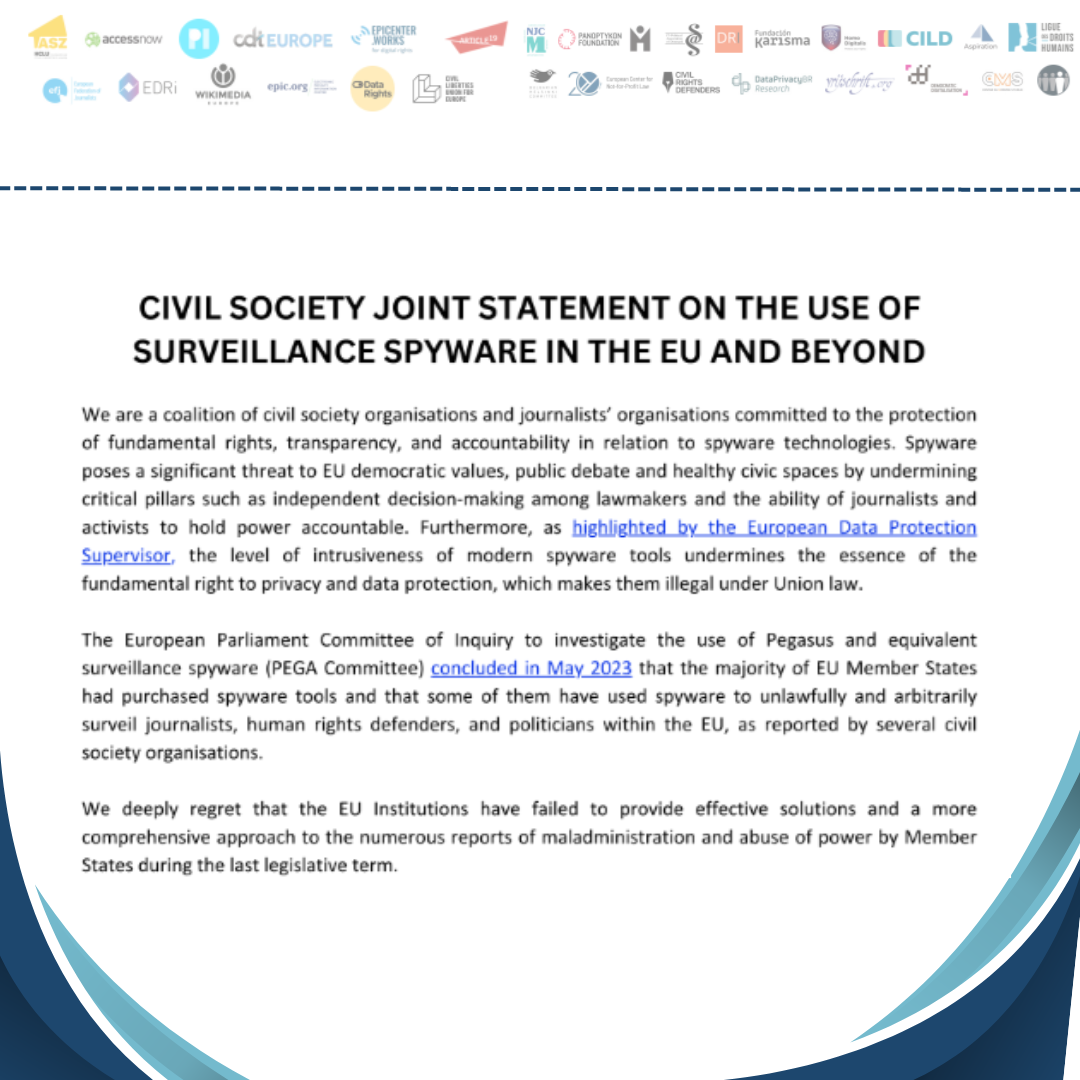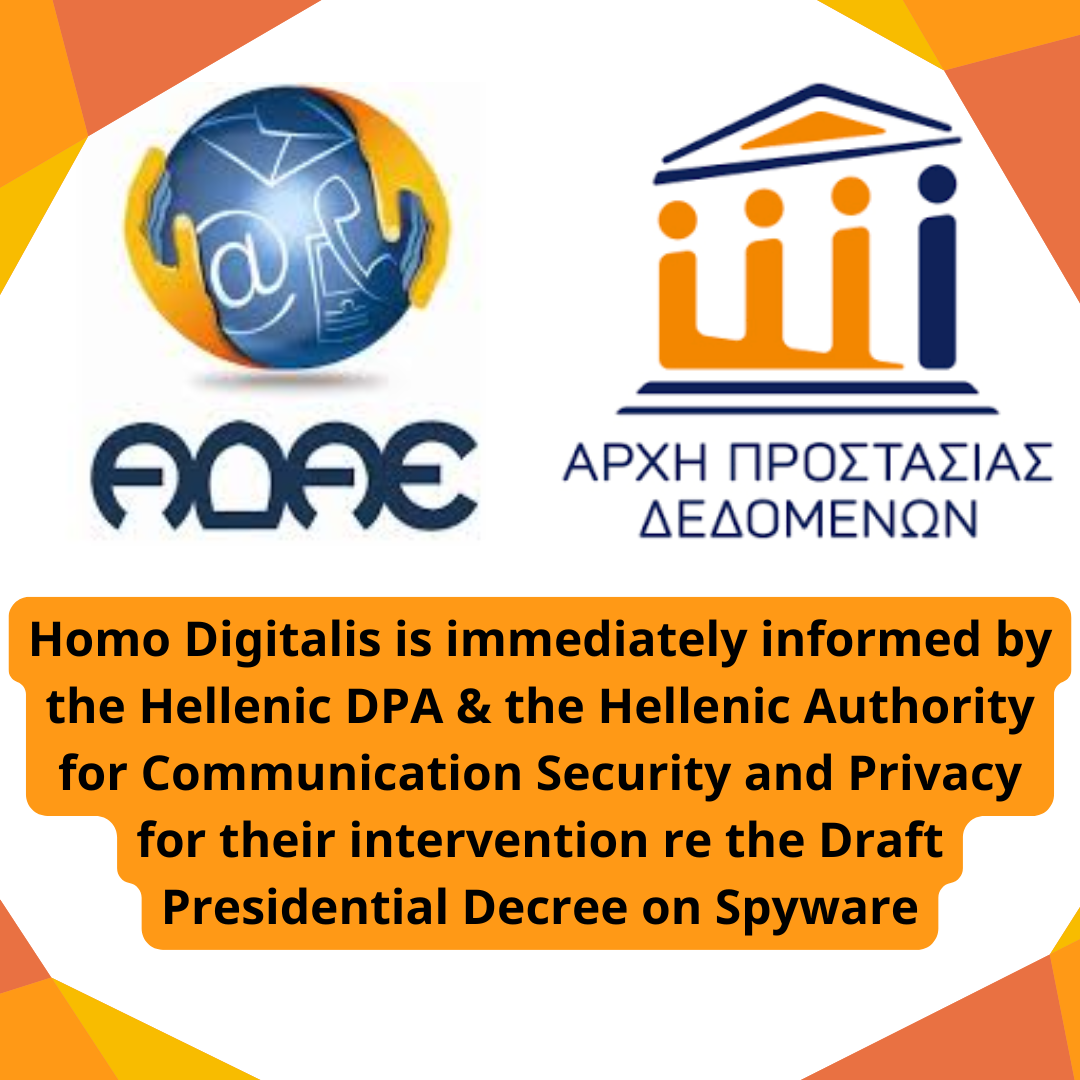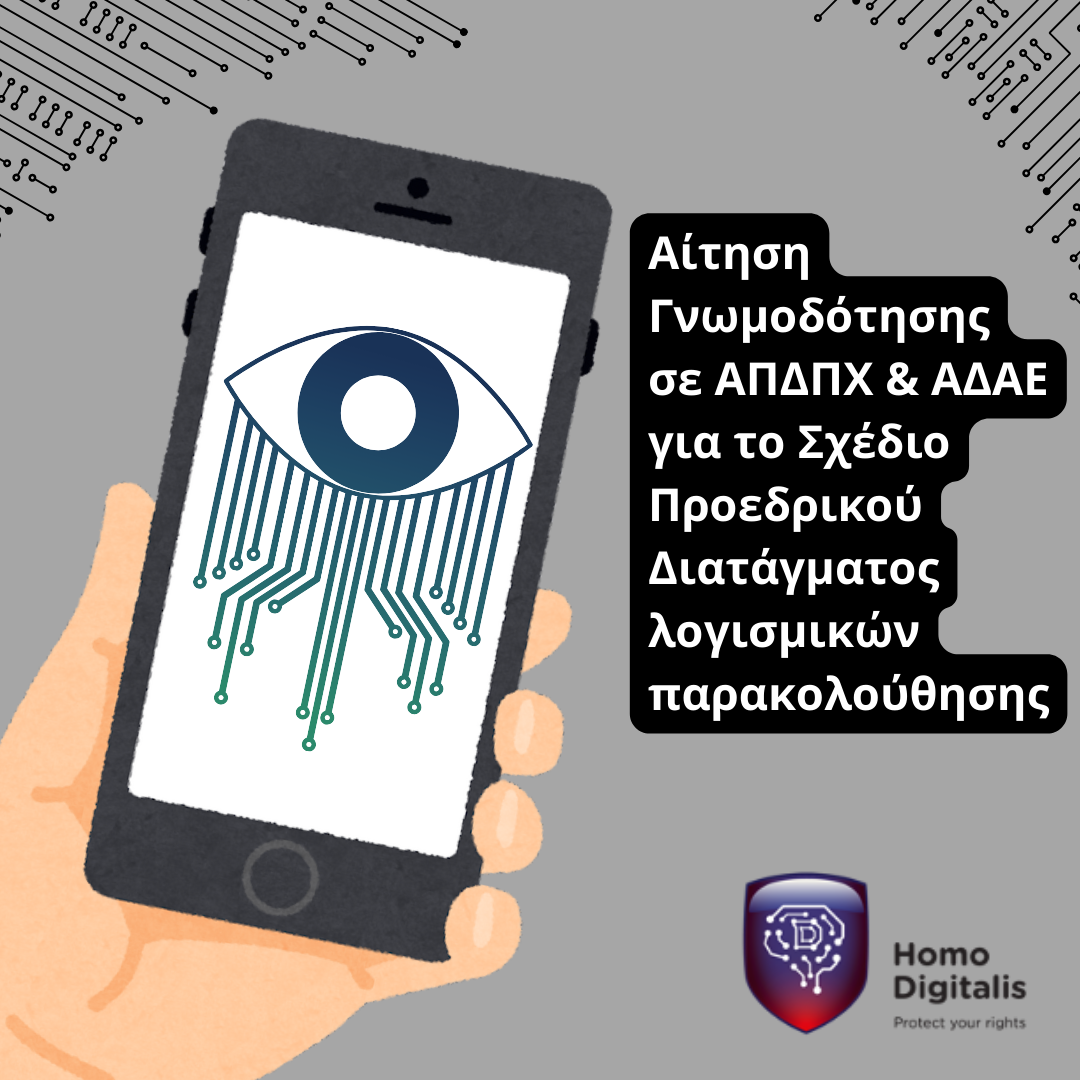Civil Society Common Statement: United Against Spyware Abuse in the EU and Beyond
Spyware isn’t just a privacy issue — it’s a threat to the very foundations of our democratic values. By undermining independent decision-making, restricting public debate, and silencing journalists and activists, spyware erodes the pillars of a healthy civic space.
As new European Union institutions prepare to take office following the EU elections, the growing threat of spyware has become a pressing global concern that demands immediate attention.
On Tuesday 3/9, Homo Digitalis joined Center for Democracy and Technology Europe (CDT Europe), alongside 30 civil society and journalists' organisations in publishing a joint statement urging the incoming EU institutions to prioritise action against the misuse of spyware in the new legislative term.
Some of our coalition’s key recommendations include:
- A ban on the production, sale, and use of spyware that disproportionately harms fundamental rights.
- Stronger export controls to prevent the misuse of these technologies beyond the EU.
- Transparency and accountability in government contracts involving spyware.
As Silvia Lorenzo Perez, Director of CDT Europe’s Security, Surveillance & Human Rights Programme, puts it: "The incoming EU institutions have the opportunity to correct the failures of the last legislature by taking concrete and decisive action against the abuse of spyware surveillance."
The new EU institutions must seize this moment to restore public trust, protect our fundamental rights, and uphold the values that define the Union.
You can read the EN version of the letter here, and the EL version of the letter here.
Homo Digitalis has also addressed related concerns, before the Council of Europe’s Commissioner for Human Rights in a recent Open Letter submitted in August. You can read more about this here.
Homo Digitalis Submits Urgent Letter to the Council of Europe’s Commissioner for Human Rights
Homo Digitalis submitted today a letter to the Council of Europe’s Commissioner for Human Rights.
We this letter, the Greek CSO aims to draw the Commissioner’s attention to the following three issues:
A. The imminent adoption of a Presidential Decree in Greece permitting state authorities to procure spyware.
B. The deteriorating condition of independent supervisory authorities in Greece, plagued by power struggles, understaffing, and financial constraints.
C. The latest developments in the ongoing PREDATOR scandal in Greece, which leaves critical questions unanswered regarding the surveillance of journalists, politicians, and lawyers through illegal means.
Moreover, with this letter Homo Digitalis urges the Commissioner:
- To give full and close attention to the situation in Greece,
- To take into account the facts presented above and urgently request further information and clarifications from Greek authorities,
- To examine the situation in Greece and take necessary steps to identify any shortcomings in the law and practices concerning human rights abuses, and
- To assist in strengthening the activities of national supervisory institutions and other human rights structures in Greece.
Homo Digitalis is immediately informed by the Hellenic DPA & the Hellenic Authority for Communication Security and Privacy for their intervention re the Draft Presidential Decree on Spyware
On Tuesday July 30th η Homo Digitalis filed a request before the President of the Hellenic Data Protection Authority (HDPA), Mr.Menoudakos (no.6277/30-07-2024), and the President of the Hellenic Authority for Communication Security and Privacy (ADAE), Mr. Rammou (no. 2755/30-07-2024), in order for the two Independent Authorities to exercise their advisory powers and issue a joint Opinion regarding the Draft Presidential Decree of Articles 13 & 47 of Law 5002 /2022 on the procurement of contracts on behalf of governmental structures for the supply of spyware or surveillance devices.
In response to our request, the response of the HDPA and ADAE has been lightning fast. Specifically, the Directorate of Supervisory Work of the HDPA informed us on the same day, 30 July 2024, that the HDPA has requested the draft presidential decree from the Ministry of Citizen Protection from 19 July 2024 in order to give its opinion on the matter, while the President of ADAE, Mr. Rammos, in a letter addressed to Homo Digitalis on August 1, 2024, informed us that ADAE, as it always does, within the framework of its constitutional and statutory competence, it goes without saying that it will exercise its advisory competence (provided for by Article 6 paragraph 1 point i of Law 3115 /2003) and on the specific draft presidential decree in the context of an institutional dialogue with all the state bodies involved in its adoption.
We await with interest the relevant developments in the near future, since, as Homo Digitalis has pointed out in its letter to the two independent authorities, the provisions of the draft presidential decree may cause irreparable risks for democracy, the rule of law and the protection of fundamental rights and freedoms in Greece.
We requested from the Hellenic DPA and the Hellenic Authority for Communication Security and Privacy to issue an Opinion on the Draft Presidential Decree for the procurement of spyware by Greek authorities
Today, 30.7.2024, Homo Digitalis filed a request before the President of the Hellenic Data Protection Authority (HDPA), Mr.Menoudakos (no.6277/30-07-2024), and the President of the Hellenic Authority for Communication Security and Privacy (ADAE), Mr. Rammou (no. 2755/30-07-2024), in order for the two Independent Authorities to exercise their advisory powers and issue a joint Opinion regarding the Draft Presidential Decree of Articles 13 & 47 of Law 5002 /2022 on the procurement of contracts on behalf of governmental structures for the supply of spyware or surveillance devices.
The lack of transparency and openness regarding the whole process of drafting the text of the draft Presidential Decree, as well as the absence of an informed dialogue with the independent authorities of the country and with the advisory bodies of the state , combined with its late preparation, which contradicts the explicit provision of the legislator in Articles 13 and 47 of Law 5002 /2022, create additional concerns in the public sphere, as well as in certain professional circles, such as politicians, journalists, and lawyers, whose preservation of the confidentiality of communications is vital for democracy.
Homo Digitalis considers that, in the absence of immediate intervention by the two supervisory authorities, there is a serious risk that the provisions of the Draft Presidential Decree may not meet the requirements set out in Union law and the case law of the CJEU, may contravene the values enshrined in Article 2 TEU and the Fundamental Rights enshrined in the Charter and, in particular Articles 7, 8, 11, 11, 17, 21 and 47 thereof, fail to comply with the requirements laid down in Council of Europe law, in particular the values enshrined in the ECHR and Convention 108 and the case-law of the ECtHR, and infringe Articles 9A, 14 and 19 of the Greek Constitution.
Furthermore, Homo Digitalis considers that there is a serious possibility that the provisions of the said Draft Presidential Decree will create a lower level of protection in Greece than in other EU Member States, thus hindering the exchange of data and information between Greece and other Member States and leading to the impossibility of fighting serious crime and terrorism at a cross-border level whenever the use of spyware by the Greek authorities has taken place.
You can read our request in detail here.
We participated at Alan Turing Institute's Workshop on th responsible governance of the use of AI in recruitment and employment’
On the 14th of March, our Director on AI and Human Rights, Lamprini Gyftokosta, participated in an online meeting organised by the Alan Turing Institute “Towards responsible governance of the use of AI in recruitment and employment’. Stakeholders from civil society, government, academia, and industry shared their views on best practices for the use of artificial intelligence (AI) in recruitment and employment, including the development of standards in this field.
Findings from this workshop will help refine the direction and scope of an AI Standards Hub research project led by researchers from The Alan Turing Institute, which will aim to investigate the role of consensus-based standards in governing the use of AI in recruitment and employment across jurisdictional borders.
In Greece, the pilot “AI based strategic workforce planning tool for the public sector” as announced by the Minister of Digital Governance, is an initiative that will apply to more than 700.000 people when completed. As Homo Digitalis underlined during the workshop, harmonised standards in areas like recruitment and employment, even if voluntary, are necessary to create a culture of compliance to the new AI rules. The role of the Greek supervisory authority in enforcing the standards and the law will be paramount, especially since according to the Greek law implementing GDRP, the employees cannot authorise Homo Digitalis to submit a complaint on their behalf without disclosing their names, putting them in an impossible position.
Homo Digitalis talks to the newspaper Kathimerini about the body-worn cameras of the Hellenic Police and our related actions
The upgrade of the Police surveillance equipment is expected to be completed in the near future, as the tender for the supply of cameras has ended.
These are about 400 24-hour cameras to be installed on patrol cars, as well as 2,000 “wearable” cameras, i.e. integrated into the uniforms of police officers, which will be able to record at will and transmit live images to the operations centre using telecommunications networks.
Homo Digitalis spoke to Kathimerini and journalist Elvira Krithari about our actions together with Reporters United & The Press Project regarding the use of cameras from 2020 & 2021 and the investigation conducted by the Data Protection Authority since then. Our team was represented by Eleftherios Chelioudakis
We would like to thank the journalist for her interest in our actions! You can read her article here.
More about our relevant actions from 2020 & 2021, here.
Homo Digitalis submitted a request for access to documents before FRONTEX on the deadly shipwreck off Pylos
In the early hours of June 14, an old steel fishing trawler, reportedly carrying up to 750 people, capsized southwest of Pylos, Greece. More than 80 people have been confirmed dead, more than 100 people have been rescued and hundreds of people are still missing.
According to reports, the boat started its journey from Libya on Friday 9/6, and had already been travelling for more than 4 full days in the Mediterranean, when on Tuesday 13/6 morning, the Italian authorities were informed of its existence by an activist. They then contacted the Greek authorities.
The EU has put in place an expensive surveillance system, called EUROSUR, which consists of satellites and drones. The aim of this system is to allow FRONTEX to monitor the EU’s external borders in order to help protect people’s lives, particularly in the Mediterranean Sea. FRONTEX has the obligation to share the information collected by satellites and drones with Member States in order to enable timely rescue operations.
Yesterday, Homo Digitalis submitted a request for access to the documents before FRONTEX, in which we ask this EU agency for answers to the following questions:
1) Were there any EUROSUR drones and/or satellites operating in the area where the vessel in question was travelling from 9/6 to 13/6?
2) Was Frontex aware of the existence of the vessel in question before Tuesday 13/6, from EUROSUR technologies?
2a)If Frontex was aware, when did it inform the Greek and Italian coastguard of the situation, as required by the EUROSUR Regulation, so that further monitoring of the vessel could be carried out and rescue operations organised?
2b) If Frontex was not aware, what are the reasons for the failure of the EUROSUR system, which is presented as a solid solution for monitoring the EU’s external borders in the Mediterranean region and protecting human lives?
You can read our request in detail here:
The Ministry of Foreign Affairs does not respond to Homo Digitalis on PREDATOR
On 11 October 2022, Homo Digitalis submitted a request to the Directorate for Multilateral Economic Relations and Trade Policy of the General Secretariat for International Economic Relations and Externalisation of the Ministry of Foreign Affairs.
We sought information on the approval/rejection of dual-use technology export license requests, as well as the country of destination of the end user. It was a strategic action in order to find out with statistical data whether technologies such as PREDATOR had been given the green light for export by the Greek authorities.
We received no response to our request, despite the fact that European legislation, and in particular Article 23 of Regulation 2021/821, provides for the keeping of relevant statistical data by the competent authorities of the Member States.
On 30 November 2022, a months-long investigation, the result of Inside Story.’s collaboration with the investigative journalism organisation Lighthouse Reports and the Israeli newspaper Haaretz brings to light that an aircraft linked to the Israeli PREDATOR tycoon delivered surveillance technology to notorious paramilitaries in Sudan in May 2022.
Yesterday, the deputy foreign minister said in a radio interview with Real FM that “”The export license given to Predator and Sudan has nothing to do with the civil war. The civil war was not caused by it.”
Our educational talk on AI & border management
Last month, we received an invitation from the Greek Council for Refugees and the European Network Against Racism Aisbl (ENAR) to speak at the European Parliament Office in Greece about Homo Digitalis’ actions in the field of migration and border management, as well as about the relevant provisions of the proposed EU regulation on AI!
It was a great pleasure to exchange ideas and views with representatives of CSOs, journalists, academics and other stakeholders who were present as well as to discuss the #ProtectNotSurveil campaign of European Digital Rights, Access Now, Platform for Undocumented Migrants (PICUM) and Refugee Law Lab, of which we are members!
We would like to thank the organizers for the great cooperation! Our Board Secretary, Eleftherios Chelioudakis, represented us, presenting our work at the event.
You can learn more about the #ProtectNotSurveil Campaign here.








